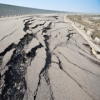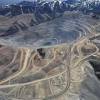Policy News Briefs
A summary of notices posted to the Federal Register by geoscience-related federal agencies, including the Department of Energy (DOE), Department of the Interior (DOI), Environmental Protection Agency (EPA), National Oceanic and Atmospheric Administration (NOAA), National Science Foundation (NSF), and more.
The White House tapped Wells Griffith this month to join the National Economic Council as the leader of its international energy efforts, including the Administration’s climate positions. Mr. Griffith currently serves as the principal deputy assistant secretary at the Department of Energy’s office of international affairs. The appointment is for a term of three months, but could lead to a more permanent position.
Congress responded to President Donald Trump’s infrastructure proposal through a series of hearings in which committee members questioned the heads of key federal agencies regarding funding mechanisms, permitting processes, and other logistical aspects of the proposal. Although the White House has been pushing for Congress to complete an infrastructure overhaul by the end of the year, senior administration officials conceded in a phone call with reporters on March 28 that pieces of President Trump's infrastructure plan are likely pass via smaller infrastructure-related bills, as recently suggested by congressional leadership, instead of the broad package proposed last month.
Congress passed a $1.3 trillion spending bill on March 23 that will fund the federal government through September 2018. The 2,232-page bill, entitled the Consolidated Appropriations Act of 2018, rejects the Administration’s proposed deep cuts to federal science agencies. Instead, many science agencies received increased funding, in part due to the increased budget authority for FY 2018 non-defense discretionary spending agreed to last month in the Bipartisan Budget Act of 2018.
For more information on the federal budget process, including a more detailed programmatic funding analysis for geoscience-related agencies, please visit AGI’s Overview of Fiscal Year 2018 Appropriations.
On March 14, the House Energy and Commerce Committee held a hearing on energy infrastructure cybersecurity and emergency response. This hearing is the third hearing in a series of hearings concerning DOE modernization efforts dating back to January 2018. The committee discussed a series of bills introduced earlier this month – H.R. 5174, H.R. 5175, H.R. 5239, and H.R. 5240 – that attempt to harden the nation’s energy infrastructure and protect the electric grid and energy supply chain from cyber-attacks.
Secretary of the Interior Ryan Zinke defended the President’s FY 2019 budget proposal for his department to members of Congress on relevant House and Senate committees. The President’s FY 2019 request for the Department of the Interior (DOI) includes a total of $11.7 billion in discretionary appropriations, which is a reduction of more than $1 billion from the current funding level. During the hearings, Secretary Zinke explained that while the Department will continue to emphasize energy development, its priorities this year revolve around "conservation, infrastructure and reorganization."
The House Committee on Science, Space, and Technology held a hearing to review the fiscal year (FY) 2019 budget request and funding priorities for the National Science Foundation (NSF). Although the Administration initially proposed a $2.2 billion cut to NSF’s budget compared to FY 2017, an addendum released with the budget request provided flat funding for the agency at approximately $7.47 billion. While the FY 2019 budget request would sustain the same FY 2017 funding level for the agency overall, it proposes a different distribution of funds for programs within NSF.
On March 15, the House Subcommittee on Energy and Mineral Resources held a hearing entitled “Abandoned Hardrock Mines and the Role of Non-Governmental Entities” to discuss the laws and procedures governing the reclamation of hardrock mines in the U.S. and highlight areas where reform is needed. A panel of expert witnesses at the hearing testified regarding the need for “Good Samaritan” legislation providing relief of the potential liability as well as funding to facilitate the cleanup of abandoned hardrock mines.
On March 7, the House Science, Space, and Technology Subcommittee on Space held a hearing on the National Aeronautics and Space Administration (NASA) budget for fiscal year (FY) 2019. The President’s FY 2019 request includes a total of $19.9 billion in funding for NASA, a 1.2 percent increase from the FY 2017 enacted funding level. The President’s request proposes shifting the agency’s existing resources to focus on deep space exploration activities, starting with another human mission to the Moon in 2023, with the intent of setting the stage for future human missions to Mars. It also proposes to eliminate the Office of Education in order to redirect its funding for deep space exploration.
On March 1, the National Oceanic and Atmospheric Administration (NOAA) and National Aeronautics and Space Administration (NASA) successfully launched the second in a new series of four highly advanced geostationary weather satellites. GOES-S was renamed GOES-17 on March 12 upon reaching its geostationary orbit 22,300 miles above the Earth, and will drift to its operational position at NOAA’s western geostationary location in late 2018. Working in tandem with the GOES-16 satellite currently operating at the eastern geostationary position since December 2017, the GOES-17 satellite will provide faster, more accurate, and more detailed data for detecting and tracking of tropical cyclones, volcanic eruptions, fire hot spots, and other natural hazards.
The Senate Committee on Energy and Natural Resources approved the Department of Energy Research and Innovation Act (H.R.589/S.2503) by voice vote on March 8, 2018. The act, first introduced by Representative Lamar Smith (R-TX-21) in January 2017, aims to provide DOE with specific guidance on energy science research coordination and reforms to streamline national laboratory management.
On March 7, the full House Committee on Natural Resources marked up the National Strategic and Critical Minerals Production Act (H.R.520), following a hearing to consider the bill last month. The Act, introduced by Representative Mark Amodei (R-NV-2) on January 13, aims to support domestic production of minerals that are of strategic and critical importance to the economic and national security, energy infrastructure, and manufacturing competitiveness of the Unites States. H.R.520 was reported favorably as amended by the committee, and now awaits further action on the House floor.
On March 6, the Senate Committee on Energy and Natural Resources held a hearing to consider the nomination of Dr. James Reilly to be Director of the U.S. Geological Survey (USGS). Chairwoman Lisa Murkowski welcomed Dr. Reilly in her opening statement, acknowledging her initial surprise that an astronaut was nominated to run the USGS, but imparting her confidence in Dr. Reilly’s extensive geoscience education and career. Senators at the hearing questioned Dr. Reilly about protecting scientific integrity, defending USGS funding, and specific issues facing their respective states.
To track the progress of key geoscience nominees, please visit AGI’s federal nominations page at https://www.americangeosciences.org/policy/federal-nominations.











